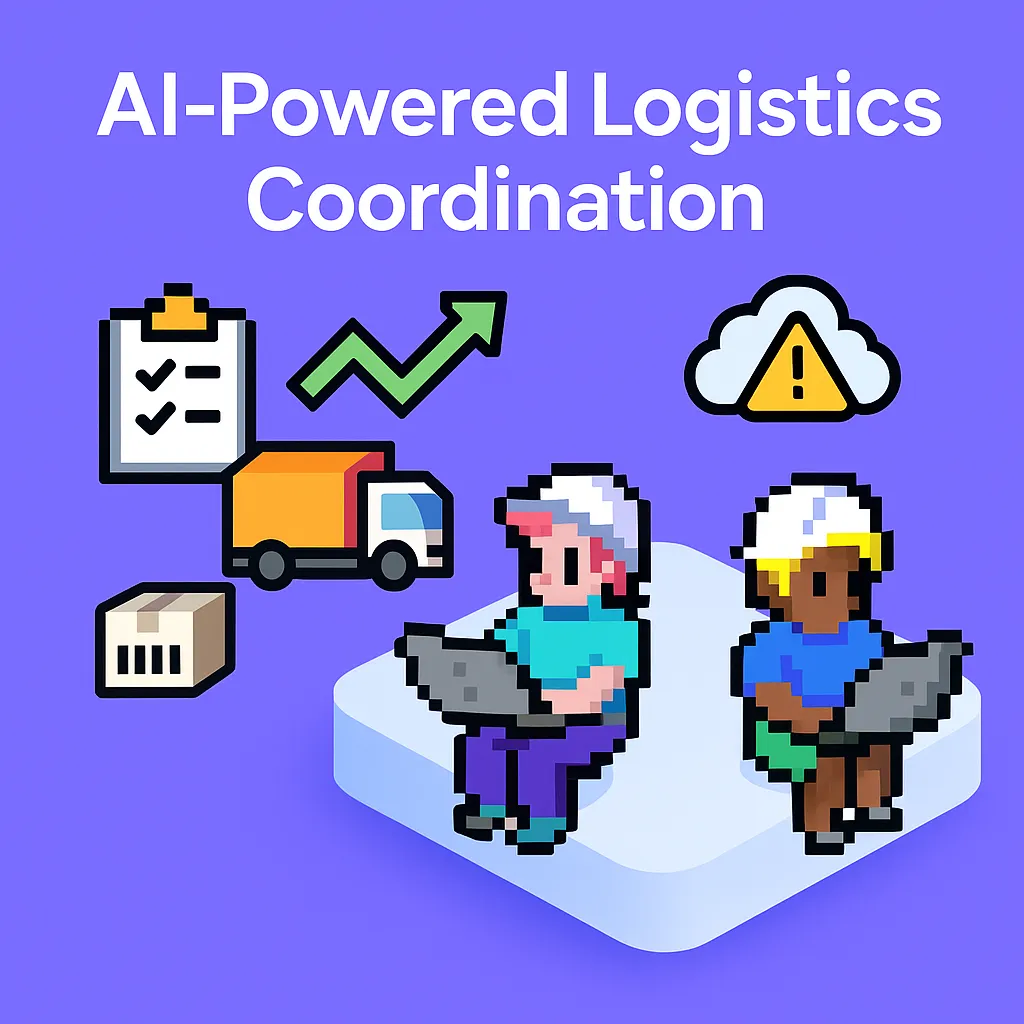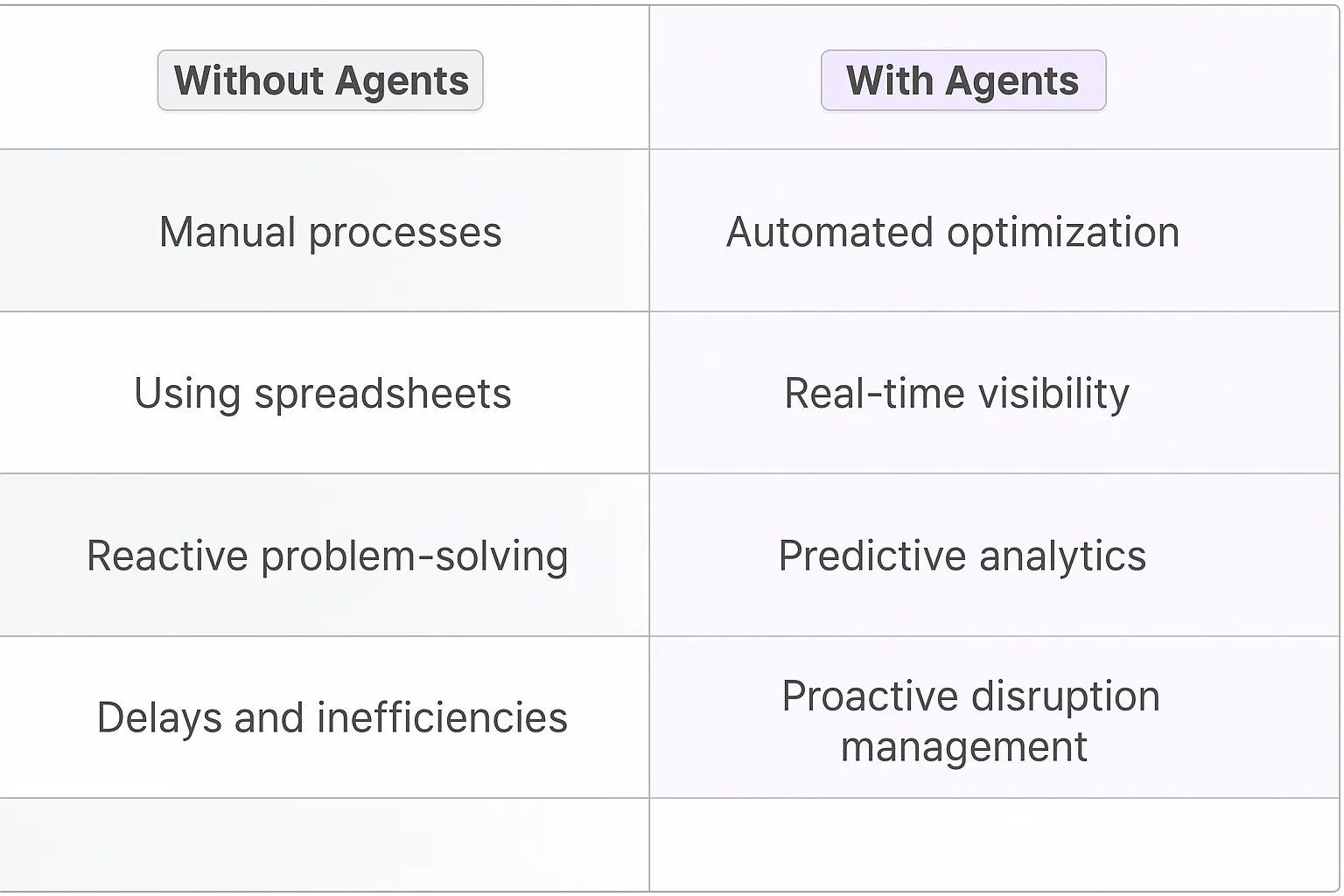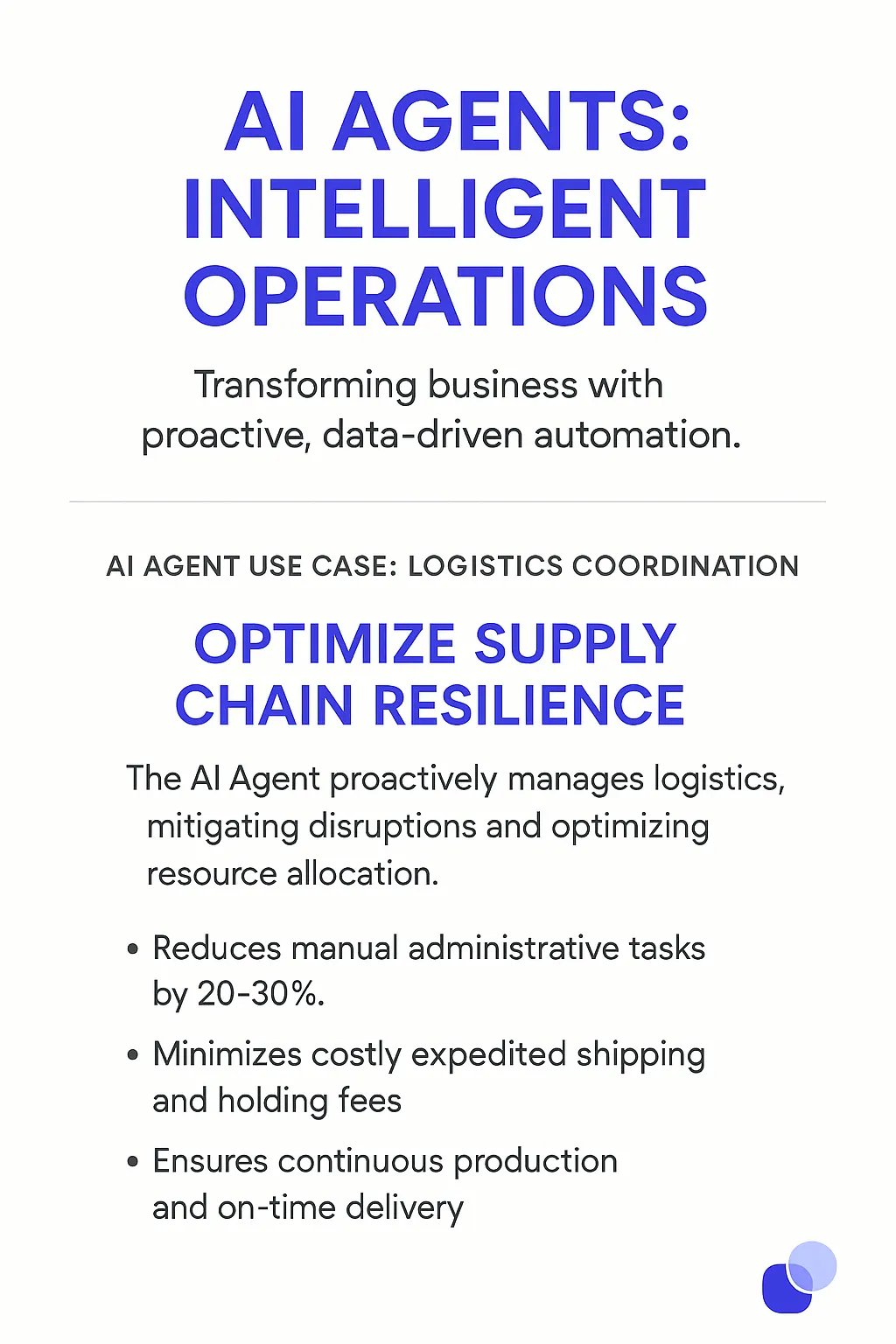Logistics Coordinator is an AI-powered system designed to optimize and manage complex supply chain operations. It's not just a tool, but a digital teammate that works alongside human logistics professionals to streamline processes, predict challenges, and make data-driven decisions in real-time. This AI solution tackles the intricate dance of moving parts in logistics, from inventory management to route optimization, with unprecedented efficiency and accuracy.
Logistics Coordinator boasts several game-changing features:1. Real-time visibility: It provides a bird's-eye view of the entire supply chain, constantly monitoring and analyzing data from multiple sources.2. Predictive analytics: The system forecasts potential disruptions before they occur, allowing for proactive problem-solving.3. Optimization algorithms: It fine-tunes routes, carrier selections, and inventory levels to maximize efficiency and ROI.4. Adaptive learning: The AI continuously improves, learning from each interaction and decision to evolve your logistics operations.5. Automated task handling: It manages routine tasks like shipment tracking and customs documentation, freeing up human resources for strategic work.These features combine to create a powerful logistics management system that adapts to the ever-changing landscape of global supply chains.

Before AI agents entered the logistics scene, companies relied on a patchwork of legacy systems, spreadsheets, and human coordinators to manage their supply chains. It was like trying to solve a Rubik's Cube blindfolded – possible, but incredibly inefficient and error-prone.
Logistics coordinators spent countless hours manually inputting data, tracking shipments, and playing phone tag with carriers. The result? A logistical nightmare of delays, miscommunications, and lost opportunities. It's no wonder that supply chain disruptions could send shockwaves through entire industries.
Enter AI agents for logistics coordination – the equivalent of giving your supply chain a PhD in efficiency. These digital teammates are transforming the logistics landscape in ways that would make even the most seasoned supply chain veteran's jaw drop.
First off, AI agents bring real-time visibility to the entire supply chain. They're constantly monitoring and analyzing data from multiple sources, giving you a bird's-eye view of your operations. It's like having a logistics command center that never sleeps.
But here's where it gets really interesting: predictive capabilities. AI agents don't just tell you where your shipments are; they forecast potential disruptions before they happen. Imagine knowing about a port delay or weather issue days in advance, allowing you to reroute shipments and keep your supply chain humming. It's not quite a crystal ball, but it's pretty darn close.
The optimization potential is off the charts. AI agents can crunch numbers and consider variables at a scale that would make a human's head spin. They're constantly fine-tuning routes, carrier selections, and inventory management levels to squeeze every ounce of efficiency out of your operations. It's like having a logistics savant working 24/7 to maximize your ROI.
Let's talk about the human factor. By automating routine tasks and providing decision support, AI agents free up your human team to focus on strategic thinking and relationship building. They're not replacing humans; they're augmenting them, creating a logistics dream team that combines machine precision with human creativity.
Finally, there's the learning curve. These AI agents are constantly improving, learning from each interaction and decision. Your logistics operations don't just get better; they evolve. It's like having a logistics coordinator that gets smarter with every shipment.
In the end, AI agents for logistics coordination aren't just changing the game – they're rewriting the rulebook. They're turning what was once a complex, reactive process into a proactive, intelligent system that adapts in real-time. For companies looking to gain a competitive edge in today's global market, embracing these digital teammates isn't just smart – it's essential.

Logistics coordination is a complex dance of moving parts, and AI agents are stepping onto the dance floor with some serious moves. These digital teammates can orchestrate supply chain symphonies that would make even the most seasoned logistics pros nod in approval.
One key process where AI shines is route optimization. Traditional methods often feel like playing Tetris with shipping containers - challenging and sometimes frustrating. AI agents, however, crunch massive datasets faster than you can say "intermodal transport," considering variables like traffic patterns, weather forecasts, and fuel costs to plot the most efficient routes.
Another process ripe for AI intervention is inventory management. These digital teammates can predict demand with uncanny accuracy, helping companies strike that delicate balance between overstocking (a cash flow killer) and stockouts (a customer satisfaction nightmare). It's like having a crystal ball, but one powered by algorithms instead of mystical energy.
When it comes to specific tasks, AI agents are the Swiss Army knives of the logistics world. They can handle everything from tracking shipments in real-time to managing customs documentation.
One task where AI truly flexes its muscles is in exception handling. When a shipment goes off course or a supplier fails to deliver, these digital teammates can instantly assess the situation, propose alternative solutions, and even implement them if given the authority. It's like having a logistics firefighter on call 24/7, ready to douse any supply chain flames before they become infernos.
Another task where AI agents excel is in communication coordination. They can automatically update stakeholders about shipment status, potential delays, or changes in delivery schedules. This constant flow of information keeps everyone in the loop without clogging up human inboxes or tying up phone lines.
AI agents can also tackle the mind-numbing task of compliance monitoring. They can keep track of ever-changing international trade regulations, ensuring that every shipment meets legal requirements. It's like having a team of eagle-eyed lawyers working round the clock, but without the hefty billable hours.
The potential of AI in logistics coordination is massive. These digital teammates are not just tools; they're transformative forces that are reshaping how we think about moving goods from point A to point B. As these AI agents continue to evolve, we're likely to see logistics operations that are not just more efficient, but fundamentally reimagined. The future of logistics isn't just automated - it's intelligently orchestrated.

The logistics industry is ripe for AI-driven transformation, and Logistics Coordinator AI agents are at the forefront of this change. These digital teammates are reshaping how companies manage their supply chain management, optimize routes, and handle inventory. Let's dive into some concrete examples of how these AI agents are making waves across different sectors.
From e-commerce giants to manufacturing powerhouses, businesses are leveraging these AI agents to tackle complex logistical challenges. They're not just automating tasks; they're providing insights that human coordinators might miss, predicting issues before they arise, and adapting to real-time changes with lightning speed.
What's particularly exciting is how these AI agents are democratizing advanced logistics capabilities. Small businesses that once couldn't afford sophisticated supply chain management are now punching above their weight, thanks to these accessible and powerful tools. It's a game-changer that's leveling the playing field and driving innovation across the board.
In the following sections, we'll explore how different industries are harnessing the power of Logistics Coordinator AI agents to stay ahead in an increasingly competitive global market. From retail to healthcare, these use cases demonstrate the versatility and impact of AI in solving real-world logistics challenges.
The e-commerce industry is ripe for disruption by Logistics Coordinator AI agents. These digital teammates can transform the way online retailers manage their supply chains, inventory management, and order fulfillment processes.
Take a mid-sized e-commerce company selling artisanal home goods. They're juggling hundreds of SKUs, multiple warehouses, and a complex network of suppliers and shipping partners. Enter the Logistics Coordinator AI agent.
This AI doesn't just crunch numbers – it's a strategic powerhouse. It analyzes historical sales data, current market trends, and even factors like weather patterns to predict demand with uncanny accuracy. This means the company can optimize inventory levels, reducing both stockouts and excess inventory costs.
But here's where it gets really interesting. The AI agent doesn't operate in a silo. It communicates in real-time with suppliers, updating them on inventory needs and negotiating prices based on volume and urgency. It coordinates with shipping partners, finding the most cost-effective routes and methods for each order.
When a customer places an order, the AI springs into action. It determines the optimal fulfillment center based on inventory availability and proximity to the customer. It then orchestrates the picking, packing, and shipping process, ensuring each item is handled correctly and efficiently.
What's more, this AI agent learns and adapts. If a supplier consistently delivers late, it adjusts future orders accordingly. If certain products often get damaged in transit, it recommends improved packaging methods.
The result? A lean, mean, logistics machine. The e-commerce company sees reduced costs, faster delivery times, and happier customers. They're able to scale operations without proportionally increasing headcount, giving them a significant competitive edge.
This isn't just automation – it's augmentation. The human logistics team is freed up to focus on strategic decisions and relationship management, while the AI handles the complex, data-driven day-to-day operations.
In the cutthroat world of e-commerce, where margins are tight and customer expectations are sky-high, Logistics Coordinator AI agents could be the difference between thriving and merely surviving. It's not just about doing things faster – it's about doing them smarter.
The construction industry is notoriously complex, with countless moving parts and razor-thin margins. It's a perfect storm for inefficiency, but also a golden opportunity for AI-driven optimization. Enter the Logistics Coordinator AI agent for construction project management.
Let's zoom in on a large-scale commercial construction project. We're talking multiple subcontractors, thousands of materials, and a timeline measured in years. Traditional project management tools barely scratch the surface of the complexity involved. But an AI agent? It thrives on this kind of intricate dance.
The AI agent becomes the central nervous system of the project. It ingests and analyzes data from every corner of the operation - from BIM models and material inventories to weather forecasts and labor schedules. But it doesn't just passively process this information. It actively orchestrates the entire logistical flow.
One of the most impressive capabilities is its just-in-time material coordination. The AI predicts exactly when each type of material will be needed on-site, factoring in construction progress, potential delays, and even traffic patterns for deliveries. This minimizes on-site storage needs and reduces the risk of materials degrading before use.
But here's where it gets really interesting. The AI agent doesn't just manage existing resources - it actively optimizes them. It might notice that crane utilization is inefficient and suggest a new scheduling algorithm. Or it could identify that certain subcontractors consistently underestimate their material needs and adjust orders accordingly.
The AI also shines in risk management. By analyzing historical project data and current progress, it can flag potential issues before they become critical. Maybe it notices that a particular phase is falling behind schedule and suggests reallocating resources from another area that's ahead of schedule.
Communication is another key strength. The AI agent serves as a central hub, ensuring that all stakeholders - from architects to subcontractors to site managers - are always on the same page. It can automatically generate progress reports, send targeted updates, and even facilitate virtual site tours using augmented reality.
The impact on project outcomes is profound. We're talking about significant reductions in project timelines and costs, improved safety records, and higher quality results. But perhaps most importantly, it allows human project managers to focus on what they do best - creative problem-solving and relationship management - while the AI handles the complex, data-driven logistics.
This isn't just a marginal improvement - it's a fundamental reimagining of how large-scale construction projects are managed. In an industry where every percentage point of efficiency gain translates to millions of dollars, Logistics Coordinator AI agents could be the key to unlocking unprecedented levels of productivity and profitability.
Implementing a Logistics Coordinator AI Agent isn't just about plugging in some fancy algorithm and watching the magic happen. It's a complex dance of data, systems, and human processes that requires careful choreography.
First off, data integration is a beast. Your AI needs to pull information from multiple sources - inventory systems, shipping carriers, customer orders, weather reports, traffic patterns. Each of these systems likely speaks its own language, uses different data formats, and has its own quirks. Getting them all to play nice together is like herding cats, if the cats were made of binary code.
Then there's the challenge of real-time processing. Logistics isn't a static game. It's constantly shifting, with new orders coming in, shipments getting delayed, and routes needing adjustment on the fly. Your AI needs to keep up with this never-ending stream of updates and make decisions faster than a New York minute. This requires some serious computational muscle and clever algorithms that can prioritize and process information efficiently.
Let's not forget about scalability. A system that works beautifully for a small e-commerce operation might crumble under the weight of a global supply chain. Building an AI that can scale gracefully as your logistics operations grow is a technical challenge that separates the wheat from the chaff in the world of AI development.
On the operational side, implementing a Logistics Coordinator AI Agent is like trying to change the tires on a moving car. You can't just hit pause on your logistics operations while you get everything set up.
One of the biggest hurdles is change management. Your human team has been running the show until now, and they've got their own ways of doing things. Introducing an AI into the mix can be met with resistance, skepticism, or even fear. You need a solid strategy to get buy-in from your team, train them on working with the AI, and help them see it as a digital teammate rather than a threat to their jobs.
There's also the challenge of defining the AI's role and authority. How much decision-making power do you give it? Can it autonomously reroute shipments, or does it need human approval? These aren't just technical questions - they're operational ones that can have significant impacts on your business processes.
Another operational headache is handling exceptions. While your AI might excel at optimizing standard operations, logistics is full of edge cases and unexpected situations. You need to have clear protocols in place for when the AI encounters something it can't handle. This might mean creating escalation pathways to human operators or continuously training your AI to handle a wider range of scenarios.
Lastly, there's the ongoing challenge of performance monitoring and improvement. How do you measure the AI's effectiveness? What metrics do you use to determine if it's actually improving your logistics operations? Setting up the right feedback loops and continuously fine-tuning your AI based on real-world performance is crucial for long-term success.
Implementing a Logistics Coordinator AI Agent is no walk in the park. But for those who can navigate these technical and operational challenges, the potential rewards in terms of efficiency, cost savings, and competitive advantage are enormous. It's not about replacing humans, but about creating a powerful synergy between human expertise and AI capabilities. That's the real game-changer in the world of logistics.
Logistics Coordinator AI agents are more than just a technological upgrade - they're a paradigm shift in how we approach supply chain management. By seamlessly integrating with existing systems and augmenting human capabilities, these digital teammates are unlocking new levels of efficiency, predictability, and adaptability in logistics operations.The impact is felt across industries, from e-commerce giants optimizing their fulfillment processes to construction firms managing complex project logistics. These AI agents are democratizing advanced logistics capabilities, allowing businesses of all sizes to compete on a global scale.However, implementing these systems isn't without challenges. From technical hurdles like data integration and scalability to operational concerns around change management and defining AI authority, businesses must navigate carefully to fully realize the potential of these tools.Despite these challenges, the trajectory is clear. As AI continues to evolve and integrate more deeply into logistics operations, we're moving towards a future where supply chains are not just managed, but intelligently orchestrated. For businesses looking to stay competitive in an increasingly complex global market, embracing Logistics Coordinator AI agents isn't just an option - it's becoming a necessity. The logistics landscape is being rewritten, and AI is holding the pen.